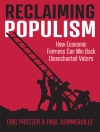This book chronicles the influence of second wave feminism on everything from electoral politics to LGBTQ rights. The original descriptions of second wave feminism focused on elite, white voices, obscuring the accomplishments of many activists, as third wave feminists rightly criticized. Those limited narratives also prematurely marked the end of the movement, imposing an imaginary timeline on what is a continuous struggle for women’s rights. Within the chapters of this volume, scholars provide a more complex description of second wave feminism, in which the sustained efforts of women from many races, classes, sexual orientations, and religious traditions, in the fight for equality have had a long-term impact on American politics. These authors argue that even the “Second Wave” metaphor is incomplete, and should be replaced by a broader, more-inclusive metaphor that accurately depicts the overlapping and extended battle waged by women activists. With the gift of hindsight and theawareness of the limitations of and backlash to this “Second Wave, ” the time is right to reflect on the feminist cause in America and to chart its path forward.
Daftar Isi
1. Introduction: Toward a New Understanding of Second-Wave Feminism.- 2. Generations Later, Retelling the Story.- 3. Feminism, Antifeminism, and the Rise of a New Southern Strategy in the 1970s.- 4. “No More Silence!”: Feminist Activism and Religion in the Second Wave.- 5. Feminist Economics: Second Wave, Tidal Wave, or Barely a Ripple?.- 6. The Gender Gap as a Tool for Women’s Political Empowerment: The Formative Years, 1980–84.- 7. Latina Mobilization: A Strategy for Increasing the Political Participation of Latino Families.- 8. Black Women Lawmakers and Second-Wave Feminism: An Intersectional Analysis on Generational Cohorts within Southern State Legislatures from 1990 to 2014.- 9. Not in Conflict, But in Coalition: Imagining Lesbians at the Center of the Second Wave.- 10. Conclusion: Assessing Second-Wave Historiography.
Tentang Penulis
Angie Maxwell is the Director of the Diane Blair Center of Southern Politics and Society and Associate Professor of Political Science at the University of Arkansas, USA. Her research focuses on identity politics.
Todd Shields is Professor of Political Science and Dean of the J. William Fulbright College of Arts and Sciences at the University of Arkansas, USA. His research focuses on campaigns, elections, and political psychology.












